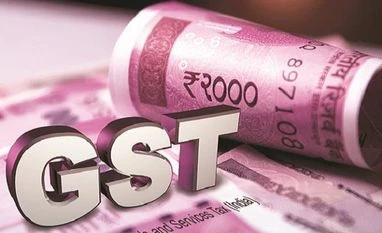The GST Council meeting on Thursday is likely to be a stormy affair as opposition-ruled states unite to pressure the Centre to give them the promised compensation for loss of revenue arising from the implementation of GST.
The 41st meeting of the Goods and Services Tax (GST) Council, to be held via video conferencing, has just one agenda for discussion -- making up for shortfall in states' revenues, sources said.
The options being explored are market borrowing, raising cess rate or increasing the number of items for levy of compensation cess.
Discussion on correction in inverted duty on certain goods like textiles and footwear is also likely, they said.
The Covid-19 crisis has further compounded the state's fiscal problems.
Ahead of the meeting, chief ministers of opposition-ruled states got together on Wednesday to devise a common strategy on the issue.
Congress President Sonia Gandhi set the tone for the GST Council meeting by calling the Centre's refusal to reimburse the states as nothing short of betrayal of the people by the Modi government.
West Bengal Chief Minister Mamata Banerjee, Maharashtra's Uddhav Thackeray, Jharkhand's Hemant Soren and chief ministers of Congress-ruled states Amarinder Singh, Ashok Gehlot, Bhupesh Baghel and V Narayanasamy attended the meeting.
"We have to work together and fight together against the Central government," Gandhi said at the meeting.
Banerjee had earlier stated the situation was "very serious" and opposition-ruled states should fight unitedly.
States like Kerala, Punjab and Bihar have already said that the Centre is morally bound to make good any shortfall in GST revenues to them in the first five years of implementation of the regime that subsumed 17 different central and state taxes.
Attorney General K K Venugopal had earlier opined that the Centre is not legally bound to make up from its coffers any shortfall in GST revenues of states.
Sources had earlier indicated that following the AG's opinion, states may now have to look at market borrowings to make good their respective revenue shortfall and the GST Council will take a final call.
The Centre had in March sought views from the Attorney General on the legality of market borrowing to make good the shortfall in the compensation fund -- a corpus created from levy of additional tax on luxury and sin goods to compensate states for revenue shortfall arising from their taxes being subsumed into GST.
The AG in his view had also said the GST Council has to decide on making good the shortfall in the GST compensation fund by providing the sufficient amount to be credited to the corpus.
Sources said the options before the Council for meeting the shortfall could be to rationalise GST rates, cover more items under the compensation cess or increase the cess, or recommend higher borrowing by states to be repaid by the future collection into the compensation fund.
Under GST law, states were guaranteed to be compensated bi-monthly for any loss of revenue in the first five years of the GST implementation from July 1, 2017. The shortfall is calculated assuming a 14 per cent annual growth in GST collections by states over the base year of 2015-16.
Under the GST structure, taxes are levied under 5, 12, 18 and 28 per cent slabs. On top of the highest tax slab, a cess is levied on luxury, sin and demerit goods and the proceeds from the same are used to compensate states for any revenue loss.
The GST Council has to decide how to meet the shortfall in such circumstances and not the central government, sources added.
Any borrowing of the central government is upon the security of the Consolidated Fund of India. Similarly, borrowing by a state government is upon the security of the consolidated fund of the state. In either case, it would lead to increased general government debt burden and a higher fiscal deficit.
The payment of GST compensation to states became an issue after revenues from the imposition of cess started dwindling since August 2019. The Centre had to dive into the excess cess amount collected during 2017-18 and 2018-19.
The Centre had released over Rs 1.65 trillion in 2019-20 as GST compensation. However, the amount of cess collected during 2019-20 was Rs 95,444 crore.
The compensation payout amount was Rs 69,275 crore in 2018-19 and Rs 41,146 crore in 2017-18.
AMRG & Associates Senior Partner Rajat Mohan said coffers of the state are drying up and they are pushing the central government for promised compensation for the loss of revenue arising on account of implementation of GST, even though the loss is attributable to the pandemic.
"It is expected that the GST Council may pass on only few tax breaks for some items however, focus would be more on increasing the tax revenues by increasing compensation cess for the sin goods," Mohan added.
Managed indirect tax service provider TMSL Founding Partner Jigar Doshi said "for a taxpayer this council meeting may not be of significance unless the states and Centre don't agree on a mid point and additional levies or extension of cess or increase rate of cess is introduced at discretion of respective states to resolve the budget constraints.
Unlock 30+ premium stories daily hand-picked by our editors, across devices on browser and app.
Pick your favourite companies, get a daily email with all news updates on them.
Full access to our intuitive epaper - clip, save, share articles from any device; newspaper archives from 2006.
Preferential invites to Business Standard events.
Curated newsletters on markets, personal finance, policy & politics, start-ups, technology, and more.



)